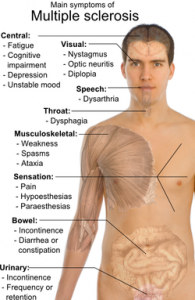 March is Multiple Sclerosis Awareness Month In the United States. (Canada will celebrate in May.) Although Multiple Sclerosis (MS) can be understood as a neurodegenerative disorder, it is defined as an autoimmune disorder because the immune systems of sufferers attack their own central nervous systems, damaging the myelin sheath of neurons. This damage causes miscommunication and missed messages between the brain and the nerves. MS can be a very emotionally heavy diagnosis because it is chronic, there is no known cure, and it a very unpredictable disorder. MS can effect any function controlled by the central nervous system.
March is Multiple Sclerosis Awareness Month In the United States. (Canada will celebrate in May.) Although Multiple Sclerosis (MS) can be understood as a neurodegenerative disorder, it is defined as an autoimmune disorder because the immune systems of sufferers attack their own central nervous systems, damaging the myelin sheath of neurons. This damage causes miscommunication and missed messages between the brain and the nerves. MS can be a very emotionally heavy diagnosis because it is chronic, there is no known cure, and it a very unpredictable disorder. MS can effect any function controlled by the central nervous system.
Symptoms tend to come episodically without any warning. One day a person with MS may be functioning just fine and the next muscle weakness may inhibit walking. These symptoms can also terminate without any warning. The unpredictable nature can be very stressful, the lack of a cure can be disheartening, and the often degenerative nature of the disorder can be depressing.
Although there have been some positive evidence of symptom episode reduction from recent treatment medications, researchers do not seem to have a solid understanding of the origins of this disorder. Genetics, environmental factors, and exposure to infectious disease are all considered possible causes and/or contributors to multiple sclerosis. It is not surprising, based on how little we know about the origins of MS, that there is little support for any prevention or treatment through diet and exercise. Some suggestions include limiting fats, especially saturated fats; eliminating gluten; and drinking lots of water. These types of tips likely abound because it returns a feeling of control when dealing with a very unpredictable disorder.
Maintaining a nutritious diet and regular exercise program can be helpful for everyone, including those diagnosed with MS. There was once a fear that exercise could trigger a relapse, but this is a myth. Specifically for those that suffer from MS, it is important to be as healthy and in the best physical shape as possible for a more positive prognosis. The stronger, more flexible, and healthier you are the less you will be impacted by episodic symptoms and the easier it will be to recover. Those diagnosed with MS should consider a well-rounded training program including aerobic exercises for heart and lung health and resistance training for strength in every muscle group. Always consult your primary care physician and neurologist when starting a new program or for suggestions in compensating for any symptoms specific to your case.
